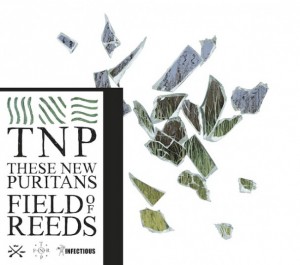Field Of Reeds
 These New Puritans (composed of brothers Jack and George Barnett, together with multi-instrumentalist Thomas Hein) are clearly a band unafraid of making “challenging” music. In fact, it’s probably their mantra: 2010’s Hidden was as much reviled as it was lauded for its punishing, dystopian experience. Keen to continue their musical evolution, the group’s sonic linguistics have metamorphosed once again for their third album. Crucially, however, their refusal to conform to box-ticking and easy labelling has remained intact.
These New Puritans (composed of brothers Jack and George Barnett, together with multi-instrumentalist Thomas Hein) are clearly a band unafraid of making “challenging” music. In fact, it’s probably their mantra: 2010’s Hidden was as much reviled as it was lauded for its punishing, dystopian experience. Keen to continue their musical evolution, the group’s sonic linguistics have metamorphosed once again for their third album. Crucially, however, their refusal to conform to box-ticking and easy labelling has remained intact.
If one simply has to call it, then it would be reasonable to consider Field Of Reeds as a neo-classical work. It is an opus marked by a predominant use of classical instrumentation, albeit in a no-frills capacity. Simple piano melodies waver beneath ominous brass overtures, with militaristic beats and stutters of more left-field textures (chromatic gongs, smashing glass) entering the fold at unpredictable junctures. Congruently, as with Hidden, this is not a comforting listen. Instead, Field Of Reeds is a work of gothic majesty, its beauty stitched alongside an unsettling ambience which treads close to terror.
It begins innocuously enough. A feathery two-note piano motif flutters along prettily: a light and soothing introduction, reminiscent of bright skies. However, the horizons are gradually darkened by heavy, minor-key brass compositions: ghostly sounds which pervade the entirety of the album, evoking images of haunted islands, barren meadows and archaic ruins. The use of traditional instrumentation yields an atmosphere which feels ancient, akin to examining the deserted ruins of a castle. The fact that this music is most easily described in images rather than sounds emphasises the sheer clarity of its vision.
Field Of Reeds isn’t just a haunting album: it sounds haunted. Jack Barnett’s dead-eyed crooning sounds as if it pivots on some unthinkable horror.
Even the vocals refrain from taking centre stage, camouflaging themselves as part of the natural landscape; supporting the scenery rather than acting as a singular focal point in the mix. Even if listeners do choose to delve into the lyrical content, things remain murky. “In crushed glass by the train line,” Jack Barnett mumbles during the ominous ‘Fragment Two’, “there is something there.”
Finding a peer for this record is a challenging task, but its singular, ghostly vision would perhaps appeal to those whose favourite Radiohead album is Kid A. Alternatively, imagine another take on Brian Eno’s Ambient 1: Music For Airports, but with that album’s blissful serenity offset by a chilling unease. And Field Of Reeds isn’t just a haunting album: it sounds haunted. Jack Barnett’s dead-eyed crooning over ‘The Light In Your Name’ sounds as if it pivots on some unthinkable horror. The song steadily builds into a climactic swell of noise, yet it never tips into a hammy cacophony, instead remaining just ethereal enough to be unnerving.
 Not bags of fun, then, and such solemnity does result in several moments where melodies are lost in the fog. But even despite these shortcomings, the rewards are glorious. Although its urgency is at odds with the rest of the album, the looping interlude of ‘Organ Eternal’ provides a well-timed change of pace, and the mournful fanfare that opens ‘Nothing Else’ is achingly beautiful in its loneliness. Best of all is ‘V (Island Song)’: Field Of Reeds’ glacial centrepiece. From delicate beginnings, it gradually twists itself into a proggy, synth-led march, before finally lapsing into an otherworldly ascension of strings and choral vocals. It’s lengthy, unflinching, and utterly captivating: a perfect microcosm of the album’s celestial eeriness.
Not bags of fun, then, and such solemnity does result in several moments where melodies are lost in the fog. But even despite these shortcomings, the rewards are glorious. Although its urgency is at odds with the rest of the album, the looping interlude of ‘Organ Eternal’ provides a well-timed change of pace, and the mournful fanfare that opens ‘Nothing Else’ is achingly beautiful in its loneliness. Best of all is ‘V (Island Song)’: Field Of Reeds’ glacial centrepiece. From delicate beginnings, it gradually twists itself into a proggy, synth-led march, before finally lapsing into an otherworldly ascension of strings and choral vocals. It’s lengthy, unflinching, and utterly captivating: a perfect microcosm of the album’s celestial eeriness.
Good luck hunting for a chorus – or even a distinctive hook – in Field Of Reeds. However, what their music lacks in simple accessibility, once These New Puritans have you under their spell, it’s hard to break away. Even if its second half doesn’t quite grip as strongly as the first, it remains mesmeric throughout. Nothing else sounds quite like it.
Similar To: Radiohead, Talk Talk
MP3: ‘V (Island Song)’, ‘Organ Eternal’

Comments (1)